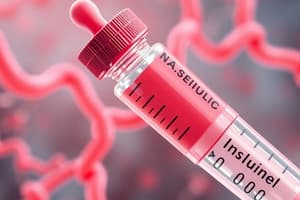Podcast
Questions and Answers
Which of the following best describes the primary role of insulin in the body?
Which of the following best describes the primary role of insulin in the body?
- To break down carbohydrates into glucose during digestion.
- To destroy pancreatic beta cells, reducing insulin production.
- To transport glucose via the bloodstream to body organs.
- To facilitate the uptake of glucose by cells. (correct)
Individuals with Type 2 diabetes always require insulin injections to manage their condition.
Individuals with Type 2 diabetes always require insulin injections to manage their condition.
False (B)
What is the primary difference between Type 1 and Type 2 diabetes concerning insulin production?
What is the primary difference between Type 1 and Type 2 diabetes concerning insulin production?
In Type 1 diabetes, the body produces little to no insulin due to the destruction of pancreatic beta cells, while in Type 2 diabetes, the body may produce enough insulin, but cells become resistant to it.
During digestion, carbohydrates are broken down into ______, which is then transported via the bloodstream.
During digestion, carbohydrates are broken down into ______, which is then transported via the bloodstream.
Which of the following is NOT a typical risk factor for developing Type 2 diabetes?
Which of the following is NOT a typical risk factor for developing Type 2 diabetes?
Gestational diabetes is a chronic condition that lasts a lifetime once diagnosed.
Gestational diabetes is a chronic condition that lasts a lifetime once diagnosed.
Besides insulin injections, what are other key management strategies for Type 1 diabetes?
Besides insulin injections, what are other key management strategies for Type 1 diabetes?
In Type 2 diabetes, cells become resistant to ______, leading to impaired glucose uptake.
In Type 2 diabetes, cells become resistant to ______, leading to impaired glucose uptake.
Which of the following is a characteristic of pre-diabetes?
Which of the following is a characteristic of pre-diabetes?
Match each type of diabetes with its defining characteristic:
Match each type of diabetes with its defining characteristic:
Flashcards
What is diabetes?
What is diabetes?
A group of diseases characterized by high blood glucose levels.
What is Gestational diabetes?
What is Gestational diabetes?
A temporary form of diabetes that occurs during pregnancy.
What is pre-diabetes?
What is pre-diabetes?
A condition where blood sugar levels are higher than normal, but not high enough to be diagnosed as diabetes.
What is Insulin?
What is Insulin?
Signup and view all the flashcards
What is Type 1 Diabetes?
What is Type 1 Diabetes?
Signup and view all the flashcards
What is Type 2 Diabetes?
What is Type 2 Diabetes?
Signup and view all the flashcards
What is glucose?
What is glucose?
Signup and view all the flashcards
What is Insulin Resistance?
What is Insulin Resistance?
Signup and view all the flashcards
What is Insulin-dependent?
What is Insulin-dependent?
Signup and view all the flashcards
What are key management strategies for Type 2 diabetes?
What are key management strategies for Type 2 diabetes?
Signup and view all the flashcards
Study Notes
- Diabetes is a group of conditions marked by elevated blood glucose levels.
- High blood sugar can lead to severe health complications.
Types of Diabetes
- Type 1 and Type 2 are chronic forms of diabetes.
- Gestational diabetes is a temporary condition during pregnancy, typically resolving after childbirth.
- Pre-diabetes is a state where blood sugar is higher than normal but not yet diabetic levels; it may or may not develop into diabetes.
Glucose and Insulin
- During digestion, carbs break down into glucose.
- Glucose is transported via the bloodstream to body organs.
- Insulin, produced by pancreatic beta cells, is essential for glucose uptake by cells.
- In healthy individuals, insulin binds to target cells, facilitating glucose intake.
Type 1 Diabetes
- The body mistakenly destroys pancreatic beta cells, resulting in reduced insulin production.
- Leads to less glucose being taken into cells and elevated blood glucose.
- Genetic factors are thought to significantly contribute to the disease.
- Usually starts before age 20
- Requires insulin injections for management (insulin-dependent).
Type 2 Diabetes
- The pancreas produces enough insulin, but target cells are resistant to it.
- Cells do not respond to insulin, leading to impaired glucose uptake.
- Genetic predisposition, lifestyle factors such as obesity, inactivity, and poor diet increase risk.
- Usually starts after age 30
- Weight loss and a low-carb diet are key management strategies.
- Type 2 diabetes represents 80-90% of all diabetes cases.
Studying That Suits You
Use AI to generate personalized quizzes and flashcards to suit your learning preferences.




